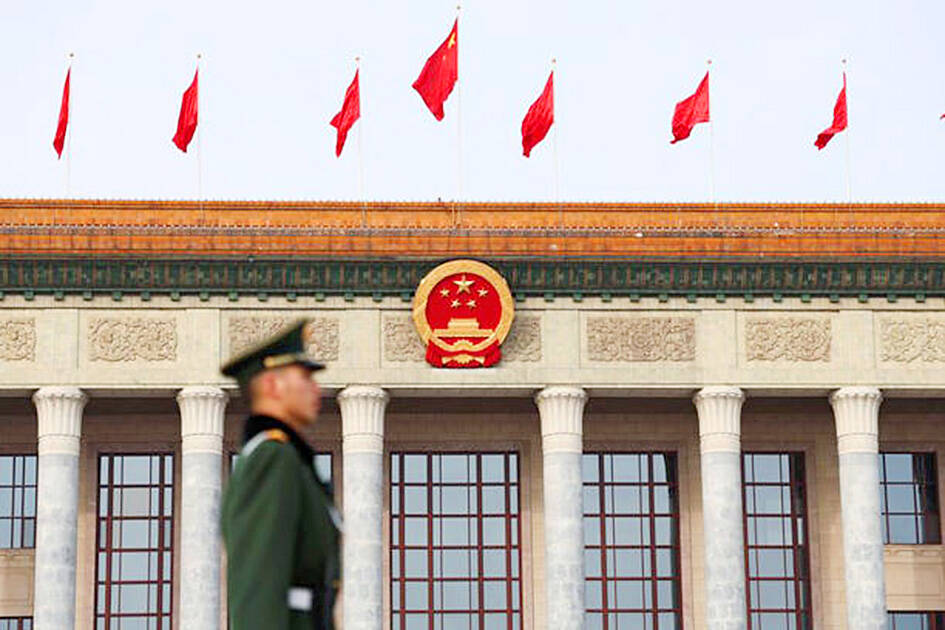The Chinese Communist Party’s (CCP) Central Committee is to gather in July for a key meeting known as a plenum, the third since the body of elite decisionmakers was elected in 2022, focusing on reforms amid “challenges” at home and complexities broad.
Plenums are important events on China’s political calendar that require the attendance of all of the Central Committee, comprising 205 members and 171 alternate members with Chinese President Xi Jinping (習近平) at the helm.
The Central Committee typically holds seven plenums between party congresses, which are held once every five years. The current central committee members were elected at the last party congress in October 2022.

Photo: Reuters
Further deepening reforms and promoting the modernization of China will comprise the main agenda of the third plenum, Xinhua news agency said yesterday, citing the party’s politburo, during a regular meeting.
Third plenums have been typically held in the autumn since the 1990s. The party was widely expected to hold one in either October or November last year, but it did not.
“The meeting had been expected to happen late last year, but was postponed without explanation,” said Julian Evans-Pritchard, head of China economics at Capital Economics.
“We should get a better sense of the leadership’s medium-term reform priorities during the third plenum,” he said.
The plenum will open amid a subdued economy, with the massively indebted property sector, once accounting for a quarter of GDP, a major drag on household sentiment.
The economy still faces many challenges, with “effective demand” still lacking, the pressure on enterprises sizable, and risks and hazards in key areas numerous, Xinhua reported, citing the politburo meeting.
“Domestic circulation is also not smooth, and the complexity, severity and uncertainty of the external environment has obviously increased,” Xinhua reported, adding that China’s economic foundation remained stable.
China has not collapsed as predicted by the “China collapse theory,” nor will it peak as forecast by the “China peak theory,” Xi said last month.
“I have repeatedly emphasized that reform and opening up are crucial tools for contemporary China to catch up with the times. China’s reform will not pause, and its opening-up will not cease,” he said.
“We are planning and implementing a series of significant measures to comprehensively deepen reform,” he said.
Third plenums have typically focused on reforms after the end of the Cultural Revolution in the late 1970s. Some have left a long-lasting and historical impact on the economy. The third plenum in December 1978 under Deng Xiaoping (鄧小平) initiated China’s economic reforms, igniting China’s transformation into a global economic powerhouse.

THE TRAGEDY OF PUNCH: Footage of the seven-month-old Japanese macaque has gone viral online after he was rejected by his mother and formed a bond with a soft toy A baby monkey in Japan has captured hearts around the world after videos of him being bullied by other monkeys and rejected by his mother went viral last week. Punch, a Japanese macaque, was born in July last year at Ichikawa City Zoo. He has drawn international attention after zookeepers gave him a stuffed orangutan toy after he was abandoned by his mother. Without maternal guidance to help him integrate, Punch has turned to the toy for comfort. He has been filmed multiple times being dragged and chased by older Japanese macaques inside the enclosure. Early clips showed him wandering alone with

Australian Prime Minister Anthony Albanese yesterday said he did not take his security for granted, after he was evacuated from his residence for several hours following a bomb threat sent to a Chinese dance group. Albanese was evacuated from his Canberra residence late on Tuesday following the threat, and returned a few hours later after nothing suspicious was found. The bomb scare was among several e-mails threatening Albanese sent to a representative of Shen Yun, a classical Chinese dance troupe banned in China that is due to perform in Australia this month, a spokesperson for the group said in a statement. The e-mail

South Korea would soon no longer be one of the few countries where Google Maps does not work properly, after its security-conscious government reversed a two-decade stance to approve the export of high-precision map data to overseas servers. The approval was made “on the condition that strict security requirements are met,” the South Korean Ministry of Land, Infrastructure and Transport said. Those conditions include blurring military and other sensitive security-related facilities, as well as restricting longitude and latitude coordinates for South Korean territory on products such as Google Maps and Google Earth, it said. The decision is expected to hurt Naver and Kakao

TENSIONS: The march went ahead without clashes, but arrests were still possible as police investigate suspects behind Nazi salutes, racist slurs and homophobic insults Thousands of people on Saturday marched in southeastern France under heavy security in tribute to a far-right activist whose killing, blamed on the hard left, has put the country on edge. The crowd — many wearing black and some covering their lower faces with masks — marched through the city of Lyon carrying flowers and placards bearing pictures of Quentin Deranque and the words: “justice for Quentin” and “the extreme left kills.” The 23-year-old died from head injuries following clashes between radical left and far-right supporters on the sidelines of a demonstration against a politician from the left-wing France Unbowed